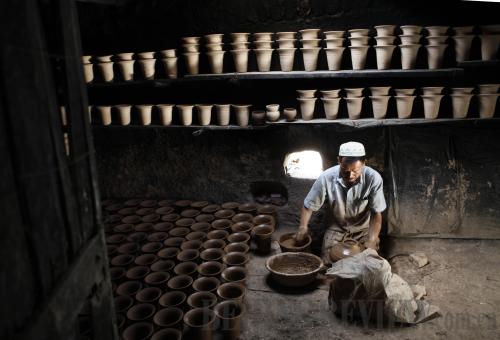|
 |
|
CENTURIES-OLD SKILL: A craftsman makes earthware in his workshop in the old city of Kashgar (HUANG ZHEN) |
To walk through the narrow lanes of the old city is to walk into living history. Craftswomen stitch traditional four-cornered doppa caps. Girls with cropped hair wearing bright frocks and mismatched plastic sandals giggle and shove one another, then sing and dance for their audience. The real pleasure here is to wander and watch.
Amago Rajim, a 58-year-old woman, has been living in a two-story house for 40 years. She can see skyscrapers and the amusement park from her living room. "The view is spectacular from the window and we can get plenty of sunshine," said Rajim. "The neighbors are all long-time friends and we know each other pretty well. Living here is very happy."
Every weekend, their four children and seven grandchildren visit the home inherited from her in-laws. "We also have an apartment in modern building in Kashgar and we go there to spend winter as the winter here is very cold," said Rajim, who revealed that people need to burn coal themselves to keep warm. "Both my husband and I have tracheitis so we cannot stay here in winter."
Thirteen-year-old Akada has been here for eight years. "The neighbors are very friendly and we have known each other for a long time, so it feels very good and safe," said Akada, who lives with his parents and grandparents in a two-story home. "I want to live here forever."
There are still some time-honored shops hidden in the narrow lanes. Atop the residential area is a famous earthenware shop owned by the Zunon family for six generations.
Tursun Zunon, 48, started to learn pottery when he was only 10 years old. In those days, it was practically the only type of daily-use container around and more than 30 households in the old city made a living making it by hand. A craftsman could provide for a family of 12 children.
"It was not easy in those days as all the materials had to be collected from different places and carried here by horses or camels, which normally took quite a few days," said Zunon. "But now with the fast delivery service, it is no problem at all."
The family suffered in the mid-1980s when plastic and iron replaced earthenware. Only four households, including Zunon's, still produced pottery until a tourism surge in the 1990s transformed earthenware from a daily necessity to a souvenir.
Zunon earns about 2,000 to 3,000 yuan ($326 to $489), enough for basic living. Although they have electricity, Zunon still pedals his pottery wheel the old-fashioned way to keep the original flavor of this skill. He has three daughters and a son who he hopes will take over after him.
| 